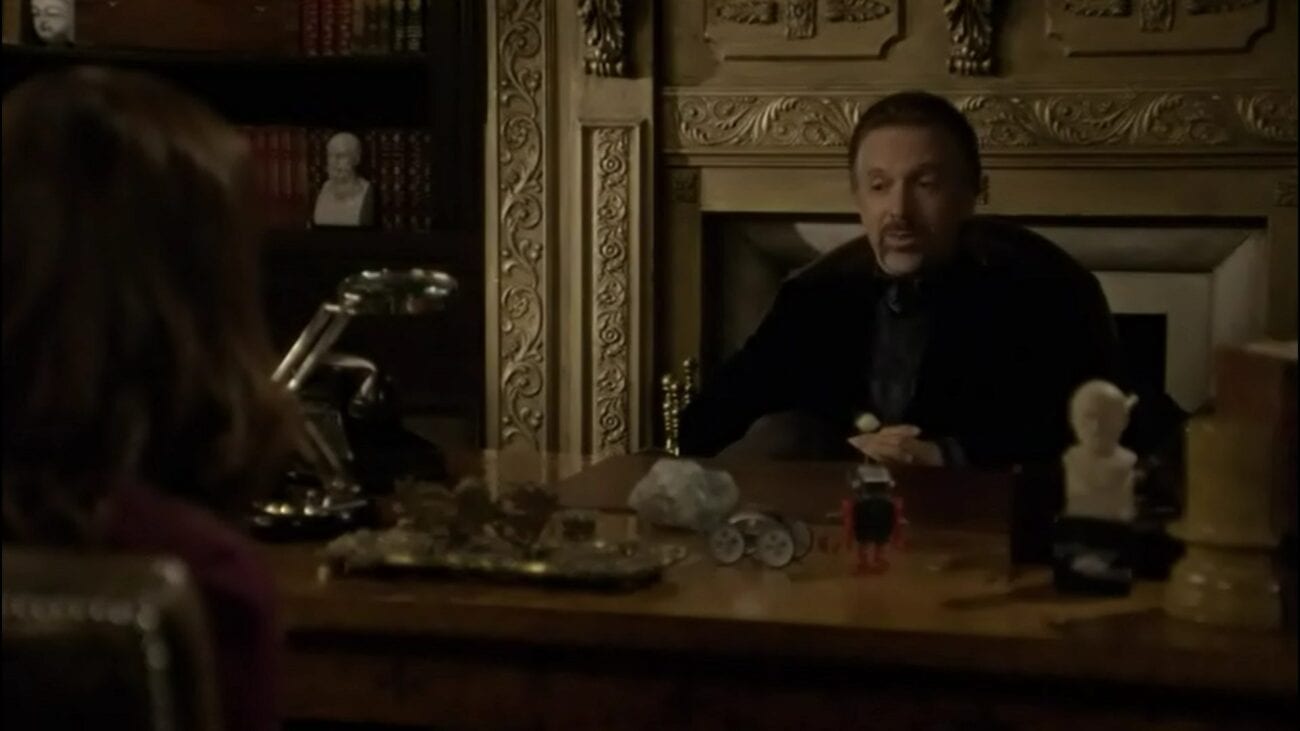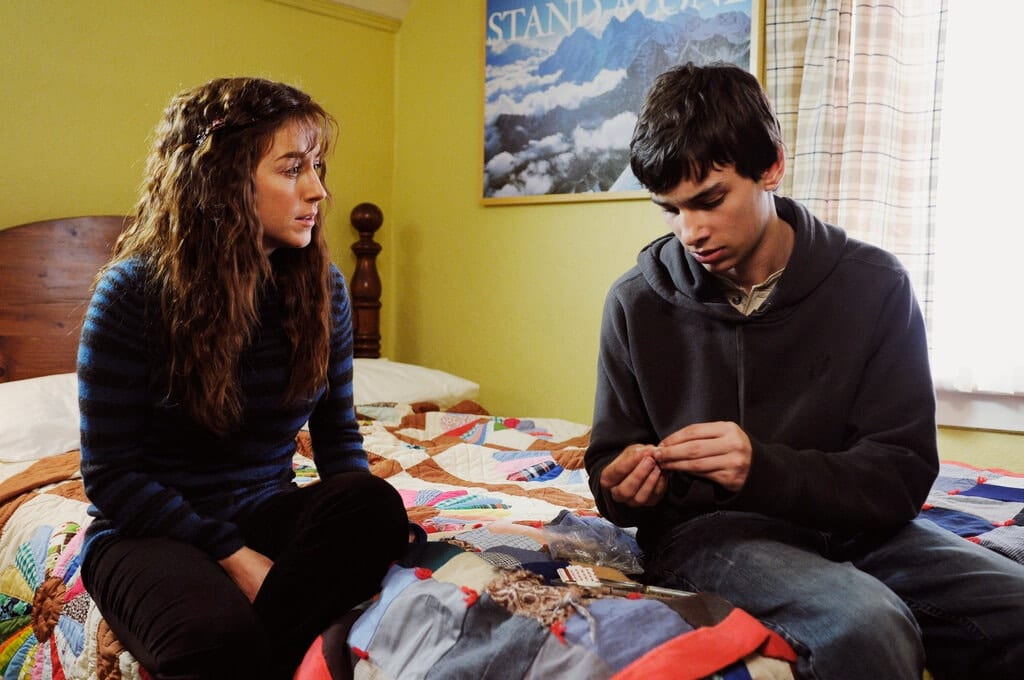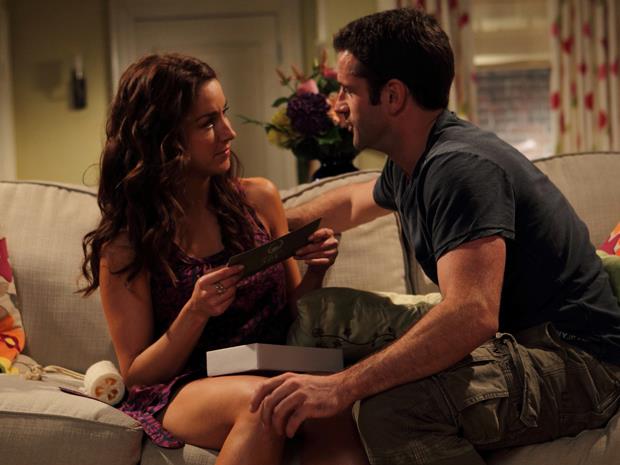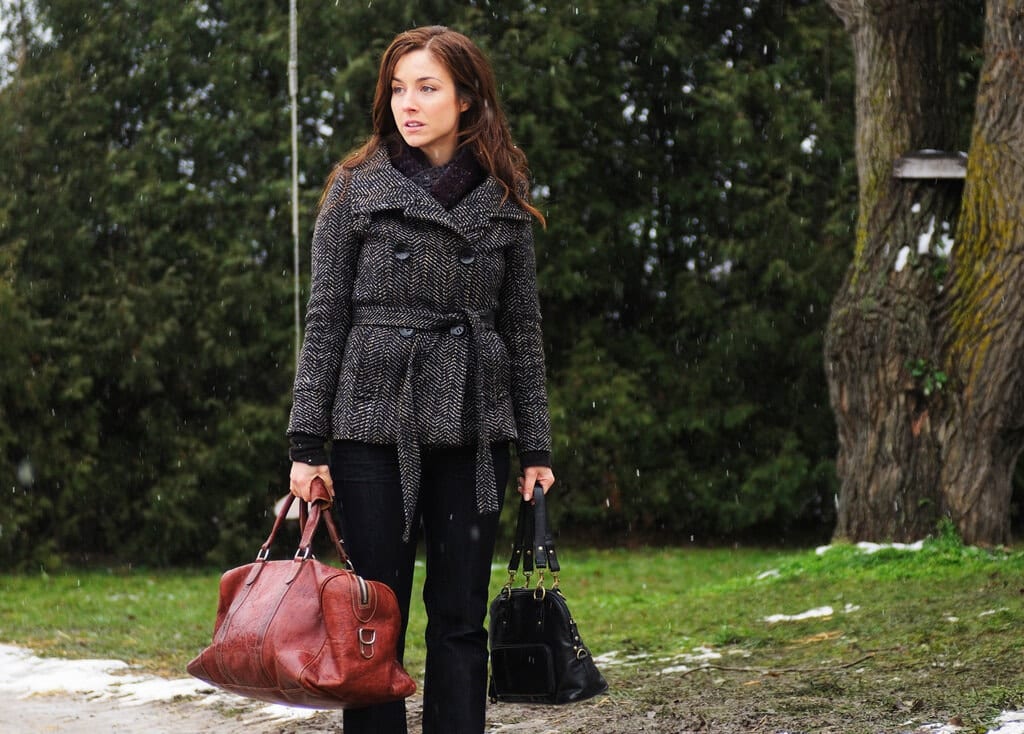I know Canadian TV is kind of “having a moment” after Schitt’s Creek’s take off into superstardom and its Emmys sweep, but don’t get it twisted: Canadian TV is bad. There are only a few of my homeland’s programs that I can recommend—and, yes, Schitt’s Creek is one of them—but the first program that ever felt authentically good was CBC’s Being Erica, which premiered in 2009.
It’s a show about 32-year-old Erica (Erin Karpluk) who feels like life has passed her by and that she’s missed her major shot at things. Once a rising star, she feels more like a burnout now—complete with getting fired from an insurance job she’s “too qualified for,” getting cancelled on by a Lavalife date (again, it was 2009), and ending up in the hospital after an allergic reaction to hazelnut syrup. It is there she is visited by a therapist who takes her back in time to “re-do” her biggest regrets.
As the seasons progress, Erica works her way into the subsequent group therapy stage, and finally the last stage of the therapy where she herself will become a therapist (or “doctor” as they’re often referred to). In the finale episode—aptly titled “Dr. Erica”—Erica meets her first patient and has to say a final goodbye to her therapist Dr. Tom (Michael Riley). It’s a simple if somewhat gratuitous episode that (mostly) honours Erica’s journey, but nine years later I am left somewhat wanting.
Erica & Dr. Tom
The majority of the episode centres on Erica’s ascension to the doctor throne. She begins having blurry visions of her first patient—Dr. Tom’s daughter Sarah (played by Orphan Black and Perry Mason star Tatiana Maslany)—who overdoses on heroin and hits her rock bottom. In between that, Erica also navigates the news that Dr. Tom is stepping down as a therapist to go be present in his personal life. The caveat and emotional piece to this is that he can never see his patients again.
There is a hesitation for Dr. Tom as he announces this. He feels like he is abandoning Erica in the same way that he abandoned Sarah. Erica’s emotional reaction to the news also doesn’t help much, which leads to a somewhat bizarre intervention from Dr. Tom’s supervisor, Dr. Naadiah (Joanne Vannicola), in which she sends Erica to her dead brother Leo’s (Devon Bostick) version of purgatory in what is dubbed as Erica’s “final lesson.”

Like Erica, Leo clings to being able to have the power to look back at his life. He is unable to let go of it and fears the unknown that comes next. It’s a very paint-by-numbers lesson, which Erica knows (and unfortunately the show is sometimes quite guilty of), but it does prove effective in making sure that she lets Dr. Tom move on to the next chapter of his life (outside the confines of time-travel therapy). Dr. Tom and Erica share a last goodbye that is tear-inducing, as they both thank one another for changing their lives. It’s a healthy decision for both parties to let go here, and overall I am happy with how the fundamental attachment issues in their relationship were dealt with.
For all the magical realism that time-travel therapy is, this is also kind of how saying goodbye to a (good) therapist often feels. It’s an emotionally weird experience to share some of the most intimate details in your life with a person who you (probably) will never see again. I had a similar kind of goodbye with my therapist before I left New York, which was very “thank you for changing my life,” without the therapist also being like “thank you for changing mine, too,” because that is a very television happy ending thing to happen but a weird thing to say in real life to a patient. This is all to say that perhaps what the Being Erica finale episode does best is propel both of its leads forward after this emotional goodbye.
Erica (& Leo) & Existence
The aforementioned dead brother, Leo, holds a logical spot in the finale, as his tragic death is Erica’s biggest regret in life. This is unpacked quite well in the Season 1 finale (“Leo”), as Erica realizes there’s nothing that can be done to bring him back, as much as she tries to bend the rules and constraints of time-travel therapy.
The visit to the purgatory hallway (as I’m calling it) is an interesting statement in the finale, as the show has never taken a stance in and around what happens after someone dies other than to say it is their end. It’s an interesting statement to say that a character in this world can hold on to their life’s memories after they die until they are ready to let go and move on to what is next.

Perhaps my biggest complaint about the Being Erica finale is its unwillingness to engage with existence further. In its presentation of a happy ending, it fails to engage with the hard truths it set up in its last two seasons about its protagonist’s existence. Just three episodes before the finale, in Season 4 Episode 8 (“Please, Please Tell Me Now”), Erica finds out that she is no longer alive in 2019 due to a bombing at Toronto’s Union Station. Erica exits this shaky experience with the knowledge to live in the present, but she is visited by a very alive future version of herself. Thus, the audience is allowed a peek behind the curtain at what the show justifies as there being infinite dimensions in which infinite versions of Erica and her life exist.
I know the show wants to live in the straightforward, somewhat fairytale-esque version of reality for its finale, but it is frustrating to watch it claw its way back from this revelation instead of engaging with it a little further. The little doses of sci-fi in Being Erica were delightful surprises that elevated the show for me (and generally I hate sci-fi, so that is high praise). They were grounded in reality and in character, and although the series wouldn’t have closed as cleanly were they to engage with it further, I do wish it had taken a bit more risk here and honoured its messy self.
Erica & Adam & Her Friends
Then, of course, there is the matter of Erica’s personal life, which in the finale is kind of sterile. Adam (Adam Fergus) is the by her side, boring, and supportive boyfriend. They have this we-should-move-in-together moment after Erica’s living room ceiling caves in, and it’s all very cute if you like the idea of Adam and Erica moving in together, but I personally don’t.

Mainly my reasoning here is I think Adam is a transition partner for Erica. I believe he is there to get her through to the next stage in her life, but I don’t see them together long term. I think their fight and break-up early on in Season 4 is rushed, and their rekindling is even more rushed (and also forced). I found their relationship to be fine, but I also found Adam’s character to be incapable of personal growth and, as a result, not the most conscientious of Erica’s feelings or journey.
To paint him as this supportive boyfriend character in the end feels flat and untrue to the journey they charted for Adam (and also Erica), and I would’ve much rather just seen Erica without a boyfriend in the finale (or “sleeping with her cat,” as she puts it in the pilot episode). Had this show’s finale aired in 2020, I think they would’ve been more okay to have her (now 35-year-old) character without a serious boyfriend or to have left more ambiguity in the ending surrounding the longevity of their relationship. 2011 was a different time, though. Also, CBC was all about playing it mostly safe back then as a network.
I am also left with this twinge of “But what if Kai (Sebastian Pigott) had been entertained as a more viable match?” The fact that it wasn’t is again the show not wanting to truly engage with its sci-fi bits. To have Erica end up with a boyfriend from the future who has to travel back in time in a specific dimension where they are both alive would’ve been too much for a lot of viewers, and also it would’ve required the writers to build out the world rules a little bit more.

I would be remiss to not touch on the supporting characters here, which in the finale are the odd couple that is Brent (Morgan Kelly) and Julianne (Reagan Pasternak). Placed in between the emotional turmoil that is Erica and Dr. Tom’s goodbye is Brent and Julianne squabbling about Brent’s pug Dutchess whom Julianne secretly hates. It’s a weird moment because it’s assumed that Brent and Julianne, having been dating in secret for a number of months, have still at least been to each other’s places, so I don’t buy this being Julianne’s first interaction with Dutchess or that Brent was putting Dutchess in doggy daycare all this time.
The plotline is played out as Julianne finally learning to compromise in the relationship, with Brent stating “we are Brulianne, not Julianne.” It’s a plotline played out to lighten the mood of the emotional finale, but it does feel like a betrayal to both characters’ respective journeys and also a total failure at unpacking the nuance of power dynamics present when dating one’s boss (again 2011 was a different place where that was never really engaged with on television).
And then there are Erica’s “great friends” she brags about in the pilot. In the finale, it is really only Jenny (Paula Brancati) who is there for the sole purpose of showing Erica and Adam an apartment. I know it’s a lot to ask of one episode to neatly tie ‘everything in a bow for all the supporting characters, but this episode did not feature Judith (Vinessa Antoine) at all. Judith deserved better. Her half-baked plots and always being Erica’s emotional support animal are classic “Black friend” territory. This is part of a larger problem in the show’s treatment of people of colour and in Canadian television at large.
This is all to say that the supporting characters really are not given anything of quality in the finale, and the choices of subplots are weird and disjointed from the rest of the episode. Many of the characters (like Tyron Leitso’s Ethan) are given decent send-offs earlier in the season, but Judith, Adam, Julianne, and Brent are not given the plotlines they deserve.
Erica & Herself
I know I’ve spent much of this doing a bit of a teardown of certain aspects of the Being Erica finale, but I do think the episode does a good job of showing how far Erica has come and the growth that she has achieved.
By entering time-travel therapy, she has been able to contextualize a lot of her choices and decisions throughout her life, and for the most part she has been able to re-frame how certain events sat in her mind. That is in itself the goal of narrative therapy at its core and is something Erica finds success with. She has been able to take a more active role in her own life and the relationships she chooses, and because of that she has found greater success and a greater level of fulfillment by ultimately getting to know herself, and her story, better.

There are many missteps in the finale that, in my opinion, kind of undermine part of the magic of what Being Erica is, but I also think that it’s subjective and that each viewer develops their own journey with the series. For me, there were certain things that I didn’t want in the dimension of Erica that I had built. I think another part of the underlying magic of Being Erica is that you can’t help but look inward after watching it.
I started re-watching it last year after a somewhat tumultuous life change and relationship change, and like Erica at the end of Season 2, I found myself without a job and without a boyfriend for the first time in a long time. It offered me wisdom and perspective at a time when I was kind of spinning, while also giving me the comfort of a childhood friend since I had first watched it 10 years ago when it came out.
I cannot recommend the show itself enough. The finale, though, you can leave or take. It exists in a safe fairytale world for me, which is nice, but it doesn’t feel as real or as lived in as some of the uncertainty the rest of the series presents. For me, Erica made stronger choices in her ending, not necessarily the safe ones presented. I’m not saying I want a Dr. Erica spin-off necessarily, but I did want a little bit more than what this ending gave me. But in general, Being Erica taught me to think bigger, and if you apply that lens to the ending perhaps it is merely a beginning in a lot of ways.


Great article. I just finished watching Being Erica and I have to agree about the finale and her relationship with Adam #boring
Yes to all of thisn
I have also watched this series on Hulu. The irony is that it came out the yr. I graduated from college, but I wasn’t ready to embark on this journey. I like her with Adam for several reasons—the most poignant being: they were both able to break through to each other’s very guarded hearts. I interpret it as safe. She might be a little farther along in “her” Spiritual journey (for now), but to have someone who gets such a calling and willing to put aside pride to support the better good—who is also a soulmate—precious.
I don’t care, I absolutely love the show! I don’t want it to end! I’m on the last season. Boohoo
I watched it when it was on and just found it on HULU and re-watched it. I love it in fact I would love to see a sequel “Dr. Erica” where Erica helps patients. Jana is really good I think she could make it happen.
I wish there was a few more seasons of time travel to the 90s. That was the best